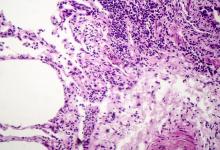Anti-phospholipid Antibodies and Myocardial Infarction. Save

The Annals of Internal Medicine features a communique from the Karolinska Institutet in Sweden demonstrating that elevated levels of antiphospholipid antibodies may be found in patients with myocardial infarction without any autoimmune co-morbidity, published in Annals of Internal Medicine reports.
Antiphospholipid syndrome (APS) is defined by arterial, venous, or microvascular thrombosis or obstetric morbidity together with confirmed positive test results, at least 12 weeks apart, for antiphospholipid antibodies (aPLs), including at least one of the following tests: anticardiolipin (anti-CL), anti–β2-glycoprotein I (anti-β2GPI), or the functional lupus anticoagulant test (1, 2).
A sub-analysis of the PAROKRANK study involved 800 first MI patients from 17 Swedish hospitals and matched healthy controls. Their blood was then analysed 6 to 10 weeks after the infarction for three different antiphospholipid antibody types: immunoglobulin G (IgG), M (IgM) and A (IgA).
They found that 11% of the MI patients had antiphospholipid antibodies against both cardiolipin and β2glycoprotein-I, which was ten times more than the controls. However, the increase was only found in the IgG antibodies, the type that is considered most associated with blood clots.










If you are a health practitioner, you may Login/Register to comment.
Due to the nature of these comment forums, only health practitioners are allowed to comment at this time.